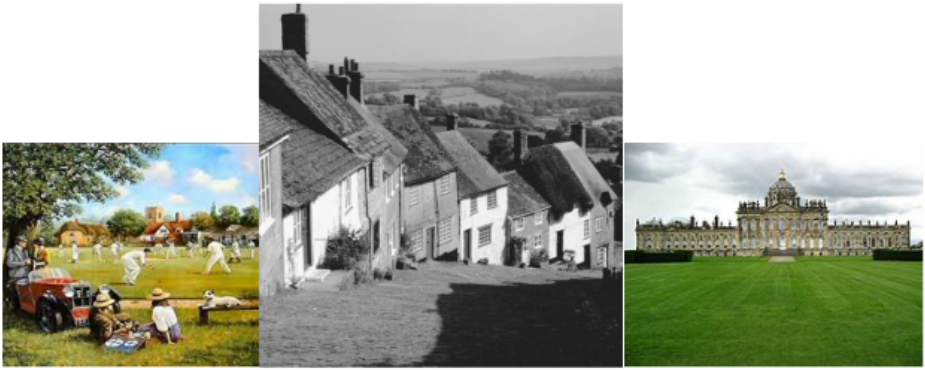- Home
- Site Index
- About Me
-
My Books
- Book List & Themes
- Strictly for Adults Novels >
-
Tales from Portlaw
>
- No Need to Look for Love
- 'The Love Quartet' >
-
The Priest's Calling Card
>
- Chapter One - The Irish Custom
- Chapter Two - Patrick Duffy's Family Background
- Chapter Three - Patrick Duffy Junior's Vocation to Priesthood
- Chapter Four - The first years of the priesthood
- Chapter Five - Father Patrick Duffy in Seattle
- Chapter Six - Father Patrick Duffy, Portlaw Priest
- Chapter Seven - Patrick Duffy Priest Power
- Chapter Eight - Patrick Duffy Groundless Gossip
- Chapter Nine - Monsignor Duffy of Portlaw
- Chapter Ten - The Portlaw Inheritance of Patrick Duffy
- Bigger and Better >
- The Oldest Woman in the World >
-
Sean and Sarah
>
- Chapter 1 - 'Return of the Prodigal Son'
- Chapter 2 - 'The early years of sweet innocence in Portlaw'
- Chapter 3 - 'The Separation'
- Chapter 4 - 'Separation and Betrayal'
- Chapter 5 - 'Portlaw to Manchester'
- Chapter 6 - 'Salford Choices'
- Chapter 7 - 'Life inside Prison'
- Chapter 8 - 'The Aylesbury Pilgrimage'
- Chapter 9 - Sean's interest in stone masonary'
- Chapter 10 - 'Sean's and Tony's Partnership'
- Chapter 11 - 'Return of the Prodigal Son'
- The Alternative Christmas Party >
-
The Life of Liam Lafferty
>
- Chapter One: ' Liam Lafferty is born'
- Chapter Two : 'The Baptism of Liam Lafferty'
- Chapter Three: 'The early years of Liam Lafferty'
- Chapter Four : Early Manhood
- Chapter Five : Ned's Secret Past
- Chapter Six : Courtship and Marriage
- Chapter Seven : Liam and Trish marry
- Chapter Eight : Farley meets Ned
- Chapter Nine : 'Ned comes clean to Farley'
- Chapter Ten : Tragedy hits the family
- Chapter Eleven : The future is brighter
-
The life and times of Joe Walsh
>
- Chapter One : 'The marriage of Margaret Mawd and Thomas Walsh’
- Chapter Two 'The birth of Joe Walsh'
- Chapter Three 'Marriage breakup and betrayal'
- Chapter Four: ' The Walsh family breakup'
- Chapter Five : ' Liverpool Lodgings'
- Chapter Six: ' Settled times are established and tested'
- Chapter Seven : 'Haworth is heaven is a place on earth'
- Chapter Eight: 'Coming out'
- Chapter Nine: Portlaw revenge
- Chapter Ten: ' The murder trial of Paddy Groggy'
- Chapter Eleven: 'New beginnings'
-
The Woman Who Hated Christmas
>
- Chapter One: 'The Christmas Enigma'
- Chapter Two: ' The Breakup of Beth's Family''
- Chapter Three: From Teenager to Adulthood.'
- Chapter Four: 'The Mills of West Yorkshire.'
- Chapter Five: 'Harrison Garner Showdown.'
- Chapter Six : 'The Christmas Dance'
- Chapter Seven : 'The ballot for Shop Steward.'
- Chapter Eight: ' Leaving the Mill'
- Chapter Ten: ' Beth buries her Ghosts'
- Chapter Eleven: Beth and Dermot start off married life in Galway.
- Chapter Twelve: The Twin Tragedy of Christmas, 1992.'
- Chapter Thirteen: 'The Christmas star returns'
- Chapter Fourteen: ' Beth's future in Portlaw'
-
The Last Dance
>
- Chapter One - ‘Nancy Swales becomes the Widow Swales’
- Chapter Two ‘The secret night life of Widow Swales’
- Chapter Three ‘Meeting Richard again’
- Chapter Four ‘Clancy’s Ballroom: March 1961’
- Chapter Five ‘The All Ireland Dancing Rounds’
- Chapter Six ‘James Mountford’
- Chapter Seven ‘The All Ireland Ballroom Latin American Dance Final.’
- Chapter Eight ‘The Final Arrives’
- Chapter Nine: 'Beth in Manchester.'
- 'Two Sisters' >
- Fourteen Days >
-
‘The Postman Always Knocks Twice’
>
- Author's Foreword
- Contents
- Chapter One
- Chapter Two
- Chapter Three
- Chapter Four
- Chapter Five
- Chapter Six
- Chapter Seven
- Chapter Eight
- Chapter Nine
- Chapter Ten
- Chapter Eleven
- Chapter Twelve
- Chapter Thirteen
- Chapter Fourteen
- Chapter Fifteen
- Chapter Sixteen
- Chapter Seventeen
- Chapter Eighteen
- Chapter Nineteen
- Chapter Twenty
- Chapter Twenty-One
- Chapter Twenty-Two
-
Celebrity Contacts
-
Thoughts and Musings
- Bereavement >
- Nature >
-
Bill's Personal Development
>
- What I'd like to be remembered for
- Second Chances
- Roots
- Holidays of Old
- Memorable Moments of Mine
- Cleckheaton Consecration
- Canadian Loves
- Mum's Wisdom
- 'Early life at my Grandparents'
- Family Holidays
- 'Mother /Child Bond'
- Childhood Pain
- The Death of Lady
- 'Soldiering On'
- 'Romantic Holidays'
- 'On the roof'
- Always wear clean shoes
- 'Family Tree'
- The importance of poise
- 'Growing up with grandparents'
- Love & Romance >
- Christian Thoughts, Acts and Words >
- My Wedding
- My Funeral
- Audio Downloads
- My Singing Videos
- Bill's Blog
- Contact Me
Journey to the Stars
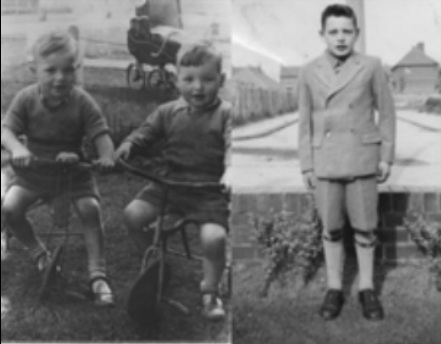
When I was a boy of 12-years-old, life seemed so uncomplicated. The year was 1954 and food rationing from the Second-World-War was still a recent memory. One's best wear comprised of 'hand-me-down' clothes and most toys were also 'hand-me-downs', including the favoured tricycle of the three boys in the family. Only wealthy adults ate eggs daily and the children of poorer households had to make do with the ‘egg top.’ In those days, we experienced a certainty which today’s youngsters will never know and would find difficult to understand. Do something wrong and the likelihood of getting caught was greater than that of escaping detection.
The formula was simple in the struggle to maintain standards in the community: do wrong and you would get caught and then punished for your transgression. There were no ‘ifs’ and ‘buts’ that were accepted under the umbrella of ‘excuses’. There was no blurring in distinction by society between ‘right’ and ‘wrong’ and consequently, there was no moral dilemma for the community to contend with.
The formula was simple in the struggle to maintain standards in the community: do wrong and you would get caught and then punished for your transgression. There were no ‘ifs’ and ‘buts’ that were accepted under the umbrella of ‘excuses’. There was no blurring in distinction by society between ‘right’ and ‘wrong’ and consequently, there was no moral dilemma for the community to contend with.
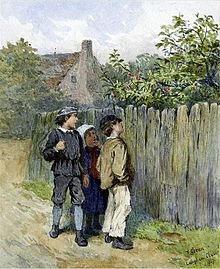
Children caught raiding their neighbour’s orchard got a severe reprimand on the spot by the aggrieved owner, and when the local Bobby frogmarched them back home to their parent’s house, their mum and dad dispensed another dose of the same corrective medicine.
Those were the days when there was honour amongst thieves; when aggressive boys or men fighting other aggrieved males were armed only with the weapons which were anatomically attached to their bodies. These were the days when burglars didn’t try to ‘leg it’ or batter the arresting officer or house occupant senseless whenever caught in the act. Even the criminal was of a better class and had standards to maintain!
Those were the days when there was honour amongst thieves; when aggressive boys or men fighting other aggrieved males were armed only with the weapons which were anatomically attached to their bodies. These were the days when burglars didn’t try to ‘leg it’ or batter the arresting officer or house occupant senseless whenever caught in the act. Even the criminal was of a better class and had standards to maintain!
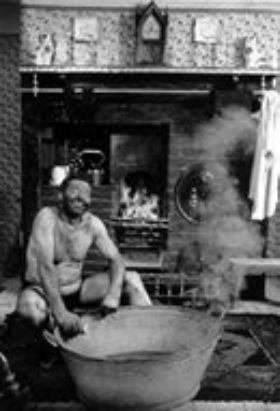
Any working-class young man between the ages of 15 and 21 years arrived home on wage day and unthinkingly handed his unopened weekly wage packet to his mother. She kept most of it as a contribution to the family budget. When the father of the house came home from his pit or factory job on wage day, he did the same before getting his wash in the tin tub. Both would receive some ‘spending money’ back from the woman of the house. Consequently, the son found this routine to be customary as he learned to ‘walk in his father’s footsteps.’ When however, the young wage earner became engaged to be married, this routine would usually change. He would then progress to ‘paying his board’, a much reduced amount that recognised he was now saving up to get married and needed to save for his 'bottom drawer.' Once married, the wheel of life would turn full circle, as working son became working husband and now handed his unopened wage-packet to a different woman in his life; his wife.
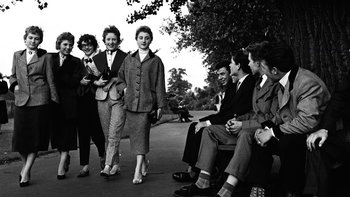
Morality was clear for all to see; it was unashamedly dressed in the certainty of black and white terms and totally devoid of any shade of grey. Girls weren't there for the taking as it so often seems today. They had to be chatted up, wooed and then courted for a number of months before one might even think of taking a romantic kiss any further.
There were two absolute truths shared by most children with unquestionable conviction: the existence of God and the undoubted wholesomeness of Horlicks and Hovis brown bread! Every child in possession of a functioning brain instinctively knew that the ‘Earth’s sandwich’ comprised of three stratas. Humans lived out their existence on the lower level and the sky represented the middle level. They also knew that only the sky separated mankind from God and His angels in Heaven and that the only way to get there was to lead a good life.
There were two absolute truths shared by most children with unquestionable conviction: the existence of God and the undoubted wholesomeness of Horlicks and Hovis brown bread! Every child in possession of a functioning brain instinctively knew that the ‘Earth’s sandwich’ comprised of three stratas. Humans lived out their existence on the lower level and the sky represented the middle level. They also knew that only the sky separated mankind from God and His angels in Heaven and that the only way to get there was to lead a good life.

Few of us cared what lived beneath our feet, in the sub-strata under the crust of the Earth’s surface. That was the domain of dead bodies, rotting corpses, creepy crawlies and all buried past life. We accepted at face value that if such a spirit as the ‘Devil’ existed and a place called ‘Hell’, then it was ‘down there’ somewhere in the bowels of the earth.
All play and weekend leisure-hours were filled to life’s brim with exploration, excitement, sport, adventure, risk, socialised learning, and more fresh air than any pair of healthy lungs could cope with.
All play and weekend leisure-hours were filled to life’s brim with exploration, excitement, sport, adventure, risk, socialised learning, and more fresh air than any pair of healthy lungs could cope with.
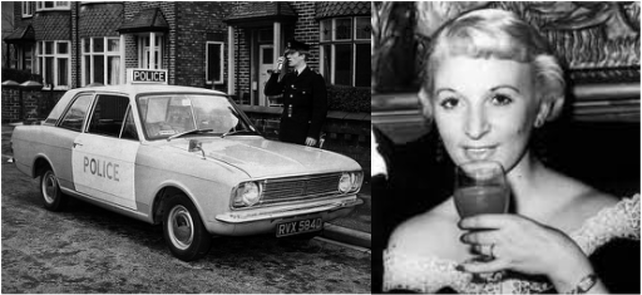
There were two community rules which were commonly acknowledged by all that helped to shape the character-building of the growing adolescent; strengthening the moral fabric of society’s code of conduct for young and old alike in the process.
The first rule stated that if you got caught with your hand in the till or your trousers down, you owned up and received your punishment without complaint. People were responsible for the consequences of their actions and were subsequently made to suffer such consequences.
Adult offenders were punished with a severity of sentence proportionate to the offence. The death penalty still existed in my early years of childhood for the murder of another person and I can still recall Ruth Ellis being the very last person in Great Britain to be hanged at H.M.Prison,Holloway on the 13th July, 1955. With regard to the crime of burglary which was viewed as a particularly vile crime, all burglars were automatically sentenced to prison and the only discretion exercised by the judge was whether it was one of two years or more! Whatever the length of sentence received corresponded more closely with the length of sentence served and though time for good behaviour might knock off a month or two from a two year stretch there was no automatic reduction of sentence by half as there is today, providing an inmate hasn't tried to escape or has knifed a Governor!
The first rule stated that if you got caught with your hand in the till or your trousers down, you owned up and received your punishment without complaint. People were responsible for the consequences of their actions and were subsequently made to suffer such consequences.
Adult offenders were punished with a severity of sentence proportionate to the offence. The death penalty still existed in my early years of childhood for the murder of another person and I can still recall Ruth Ellis being the very last person in Great Britain to be hanged at H.M.Prison,Holloway on the 13th July, 1955. With regard to the crime of burglary which was viewed as a particularly vile crime, all burglars were automatically sentenced to prison and the only discretion exercised by the judge was whether it was one of two years or more! Whatever the length of sentence received corresponded more closely with the length of sentence served and though time for good behaviour might knock off a month or two from a two year stretch there was no automatic reduction of sentence by half as there is today, providing an inmate hasn't tried to escape or has knifed a Governor!
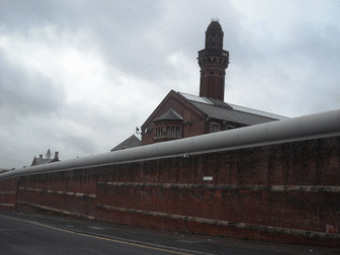
Being caught without a dog, radio or TV licence might warrant a small fine along with a mention in the local press and the shame of being so-named within your community. Transgressions in the work place always resulted in the instant sacking of the worker without the accruement of pension rights, or the forced resignation of the offender. With regard to rapists and the molesters of children; had they been offered capital punishment instead of the prison sentences they were sentenced to, many second offenders would have probably taken the option of the hangman as the easier way out! 'H.M.Prison Strangeways' in Manchester always fascinated me as a child as I walked passed its outer wall that seemed to me to go on forever.
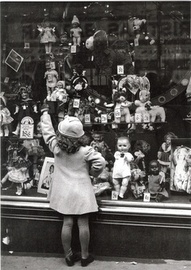
The second rule identified a hierarchy of protected human species. Top of the list were children, followed by pregnant women, then widows, women in general, old age pensioners, disabled and infirm citizens, soldiers, and finally, able-bodied men. Despite being high on their list of 'protected species,' children seemed to receive a double-edged sword. Because parents wanted their offspring to grow up as ladies and gentlemen, it was universally accepted that the best way to achieve this was to occasionally physically chastise them; hence the saying, "Spare the rod and spoil the child." Looking in shop windos was never discouraged ,but wanting to buy all that was displayed certainly was.
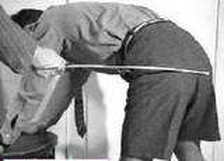
Although they came first in the list of ‘protected species’, children came last in the sitting-down rotas of overcrowded buses and trains. They were, without exception, the ‘last’ to be heard to voice an opinion in any conversation which included adult participants. In the presence of adults, the main requirement of children was to remain respectful and silent, and to only speak if spoken to. Children of all social classes were rarely molly-coddled in areas of human functioning and social expectation. Do wrong in school and you got six of the best.
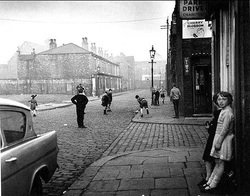
Although as children, we were deprived of today’s surplus toy mountains, what we lacked in material stimulation, we more than made up for through our imagination, collaboration and cooperation, along with using little more than a few of earth’s accessories that could be found in any house. Our childhood games and activities were played in a spirit of fairness and sportsmanship. In true Olympian spirit, ‘to play’ was as important as ‘to win’ and yet, nobody ever tried to suggest to us that ‘healthy competition’ and ‘winning’ were wrong!
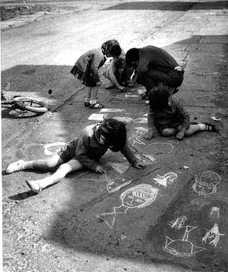
Often, simple things available to all and sundry were all that was required as the foundation of a game. Easily accessible items were fashioned and put to new purpose in those games borne from the power of our imagination. Hours of play could be had through the simple use of a piece of wood, a pebble, a piece of chalk with which to draw a dozen squares on the pathway, a chain of daisies, a bucket and spade, a few chicken feathers with which to make a head-dress, or perhaps a dustbin lid that doubled as a knight’s shield and which defended one's body from enemy blows. Simply using one’s curved body as a ‘gym horse’ enabled hours of harmless pleasure to be derived by a group of children leap-frogging their evening away.

On a Monday evening we might be a policeman or a villain, a cowboy or a ‘Red Indian’ (political correction had yet to be born), one of King Arthur’s Knights of the Round Table or even Rob Roy. We always recognised the potential presence of our ‘wicked side’ and there was never a shortage of children wanting to play the role of a villain, renegade or robber.
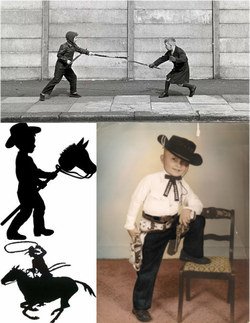
On a Tuesday evening, we’d take our turn at being Robin Hood or the evil Sheriff of Nottingham. Any old sticks or rods would be used as swords of play. Dad’s clean handkerchief of large proportion, tied across your mouth as you ran astride your mother’s long-handled sweeping-brush would make you Tuesday’s cowboy. A section of your mother's washing line would be used to swing in looping manner above your head to rein in the fleeing bank robber.
And just as Robin Hood's arch enemy was the Sheriff of Nottingham, the natural foe of the cowboy in the 1950s (before anyone had ever heard of the term 'political correctness'), were the different tribes of 'Red Indian.' All that was required to make a brave's headdress was a rubber band fastened around the forehead with a chicken feather poking out. To complete the transformation from that of 'cheeky laddie' to 'Cherokee warrior', the judicious application of mum's lip stick and mascara to the face of the boy would ensure that he was now ready to fight the cowboys.
And just as Robin Hood's arch enemy was the Sheriff of Nottingham, the natural foe of the cowboy in the 1950s (before anyone had ever heard of the term 'political correctness'), were the different tribes of 'Red Indian.' All that was required to make a brave's headdress was a rubber band fastened around the forehead with a chicken feather poking out. To complete the transformation from that of 'cheeky laddie' to 'Cherokee warrior', the judicious application of mum's lip stick and mascara to the face of the boy would ensure that he was now ready to fight the cowboys.
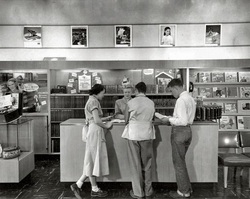
Wednesday evenings would be given over to either school homework or household chores and Thursday evenings would involve going down to the local record shop with a few of your friends to listen to the latest songs in the charts.We would try to hang around listening to the latest hit until some spoil sport adult moved us on. I never saw so many teenage hours spent listening to records they couldn't yet afford to buy! We would then finish back in our bedroom with a few of friends where we would either play records in our bedroom or talk about girls or boys at school who we fancied. There would usually be one person at the door keeping an ‘eye out’ for parental intruders while another of the group would waft all trace of the smoke out of the open bedroom window while the wicked weed of a woodbine was passed around.

Friday evenings might be spent plotting with the rest of the gang inside some makeshift woodland den, garden shed or elaborate tree house that it had taken ten of us to build during the six weeks school summer holidays, while the more physically mature or precociously inquisitive adolescent might seek to fill in the gaps in their biological learning by engaging in games such as ‘Truth or Dare’, ‘Kiss and Tell’ or ’Post Man’s Knock.’ In the event of one getting too bored by collecting too many forfeits instead of kisses, the remainder of the evening could be spent swapping stamps, picture cards or comics.
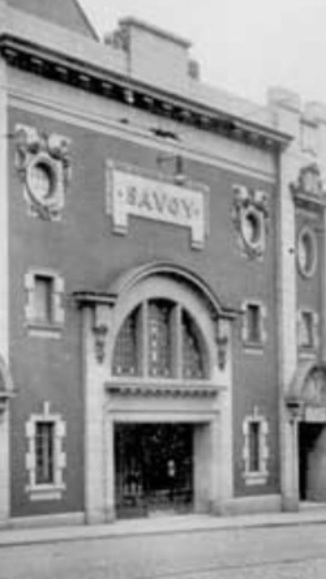
Up at the crack of dawn on a Saturday, the earlier part of the day was devoted to earning enough money from household chores to pay for the cinema ticket and an ice cream at the matinee performance of the day. If you got to the matinee early enough, you’d be able to watch the main feature film twice. If you couldn’t manage to raise the necessary entrance fee, you would arrive late and one of your pals would go to the toilets and allow you free entrance via the fire exit door that he opened. It wasn’t at all unusual to see one person go into the toilet and two come out! The person who got free entrance would then buy the ice cream for his accomplice-in-crime who’d initially made the feigned journey to the toilets. Whether early or late, you could always shout your head off when the film reel broke down, (which it always did), secure in the knowledge that they’d be no adult ushers around to tell you to ‘button it'.
The arrival of Sunday morning for most children would mean their compulsory attendance at church, dressed in posh clothes, fashioned to make you look like ‘a small adult’ in the making. Individual styles of clothes for young people were unheard of before the late 60's. It would take Rock and Roll, Punk Rock, Heavy Metal along with images of Elvis Presley, Johnnie Ray, Cliff Richard, Marty Wilde, Marlon Brando , Mary Quant , Sandy Shaw etc to bring into fashion, clothes designed to mark the differences between teenagers and their parents.
The arrival of Sunday morning for most children would mean their compulsory attendance at church, dressed in posh clothes, fashioned to make you look like ‘a small adult’ in the making. Individual styles of clothes for young people were unheard of before the late 60's. It would take Rock and Roll, Punk Rock, Heavy Metal along with images of Elvis Presley, Johnnie Ray, Cliff Richard, Marty Wilde, Marlon Brando , Mary Quant , Sandy Shaw etc to bring into fashion, clothes designed to mark the differences between teenagers and their parents.
After church on Sunday,there would be the Sunday dinner eaten around the family table.Then, the working-class family either went for a country walk in the fresh air or visited one of the parks that had a bandstand. Entrance was always free and we grew up loving brass bands.There was also the Lido where children and parents could enjoy an open air swim. The families of the gentry and the upper middle classes made their usual visit to see some grand country house or attended the village cricket match as either player,spectator or supporter.
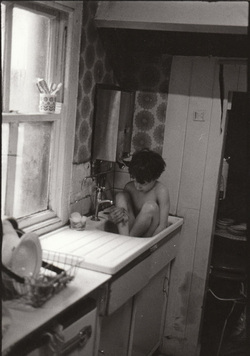
Sunday evenings would be spent preparing for the activities of the week ahead. Shirts would be ironed, socks darned, shoes polished and sandwich filling prepared for Monday’s ‘snap boxes.’ Everyone in the house would be expected to have a full body wash for the start of the new week tomorrow, even if there was insufficient hot water in the cistern to warm the bath water.The use of the bath room was strictly allocated on a hierarchy of wage earner within the household. Dad got the first bath and the warmest, cleanest water, while the bath contents gradually got colder and muckier the farther down the family line one was. More often than not, the youngest bairn in the household got their bath in the kitchen sink!

Five things distinguished the ’working class’ from their ‘middle class’ counterparts:
(1) Whether they voted Conservative or Labour.
(2) Whether they called their loo their ‘toilet’ or ‘lavatory.’
(3) Whether their loo facilities were ‘inside’ or ‘outside’ the house.
(4) Whether they ate ‘lunch’ or’ dinner,’ ‘evening meal’ or ‘tea.’
(5) Whether their week commenced on a Sunday or a Monday.
These were happy days for me; peaceful days, happy days; days I’ll never forget. Oh to be twelve again in that marvellous year of 1954.
William Forde
Children’s author
March, 2012.
(1) Whether they voted Conservative or Labour.
(2) Whether they called their loo their ‘toilet’ or ‘lavatory.’
(3) Whether their loo facilities were ‘inside’ or ‘outside’ the house.
(4) Whether they ate ‘lunch’ or’ dinner,’ ‘evening meal’ or ‘tea.’
(5) Whether their week commenced on a Sunday or a Monday.
These were happy days for me; peaceful days, happy days; days I’ll never forget. Oh to be twelve again in that marvellous year of 1954.
William Forde
Children’s author
March, 2012.

